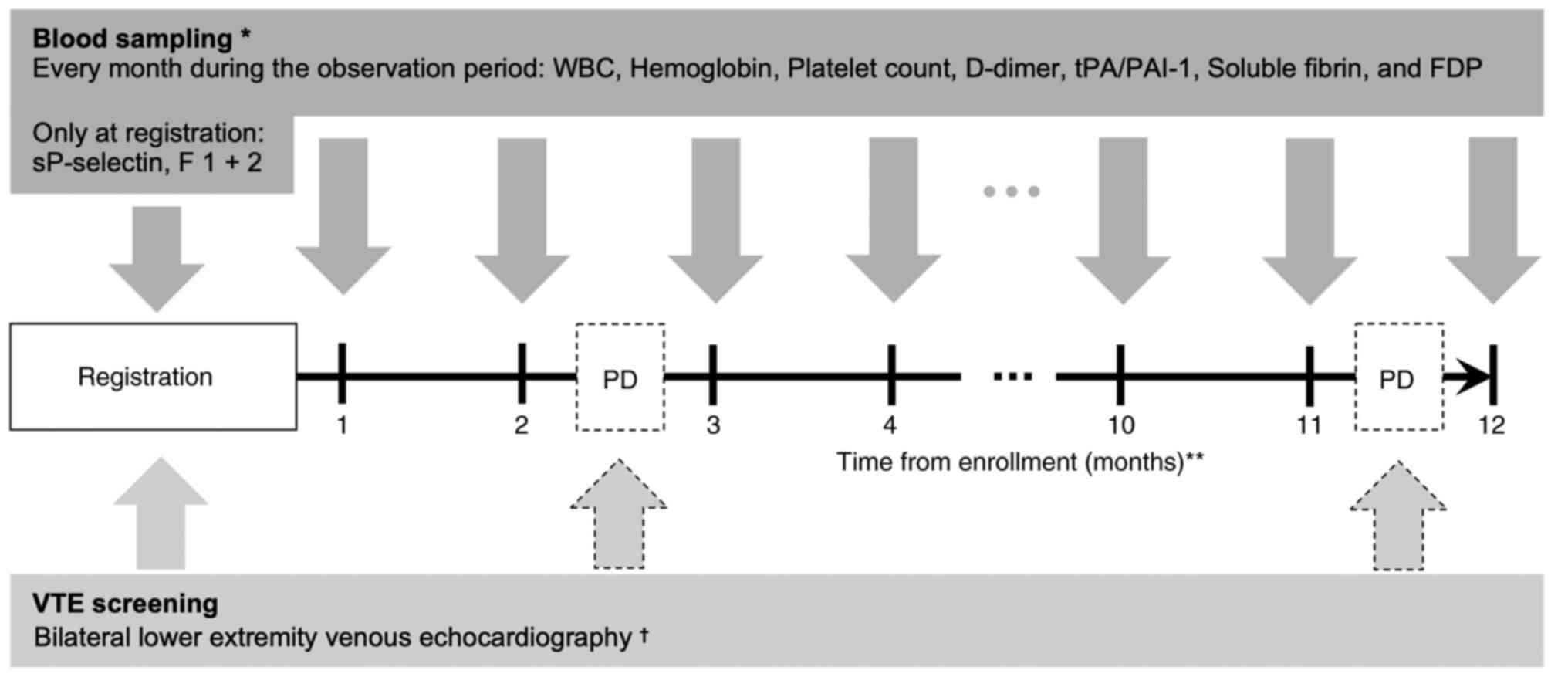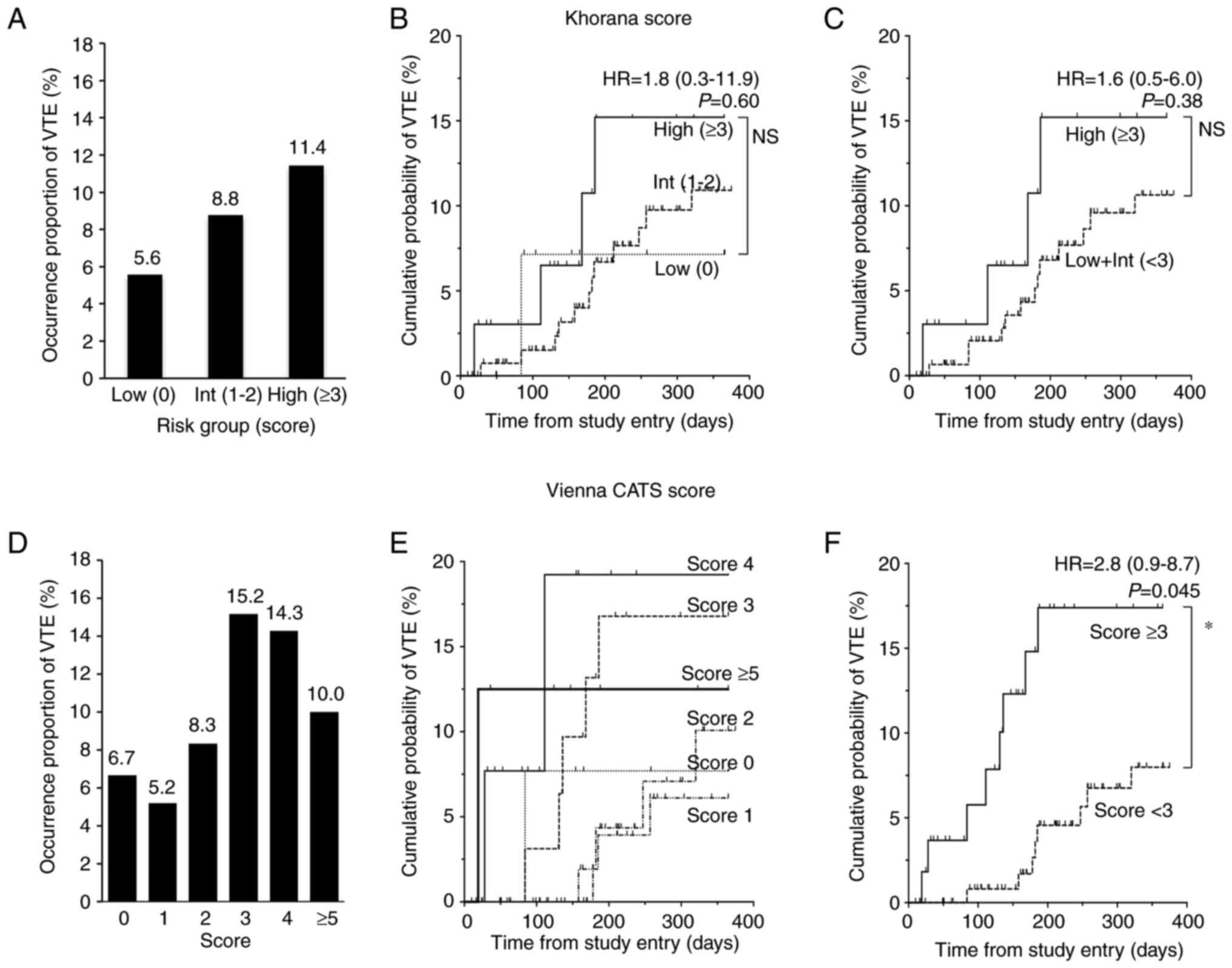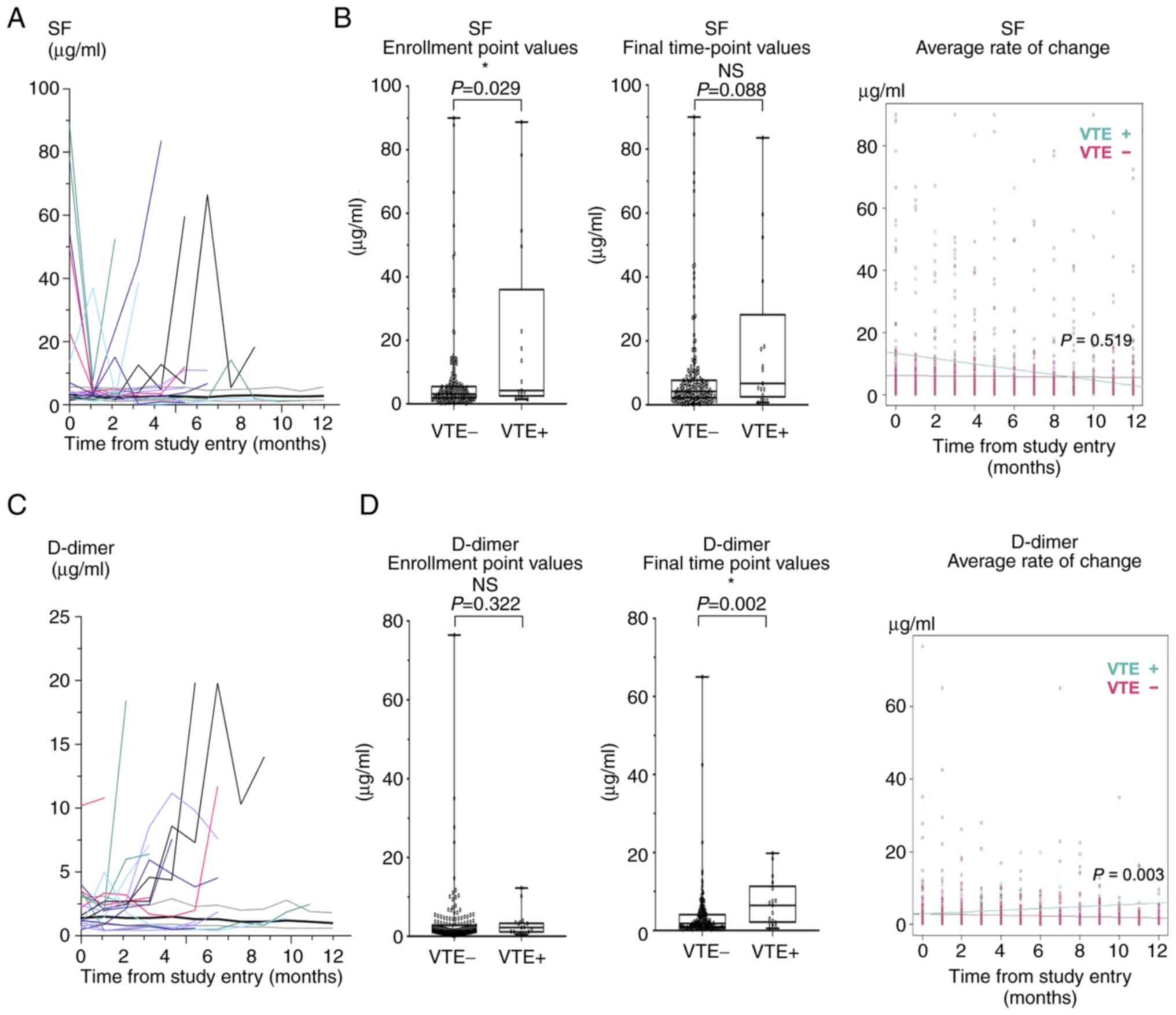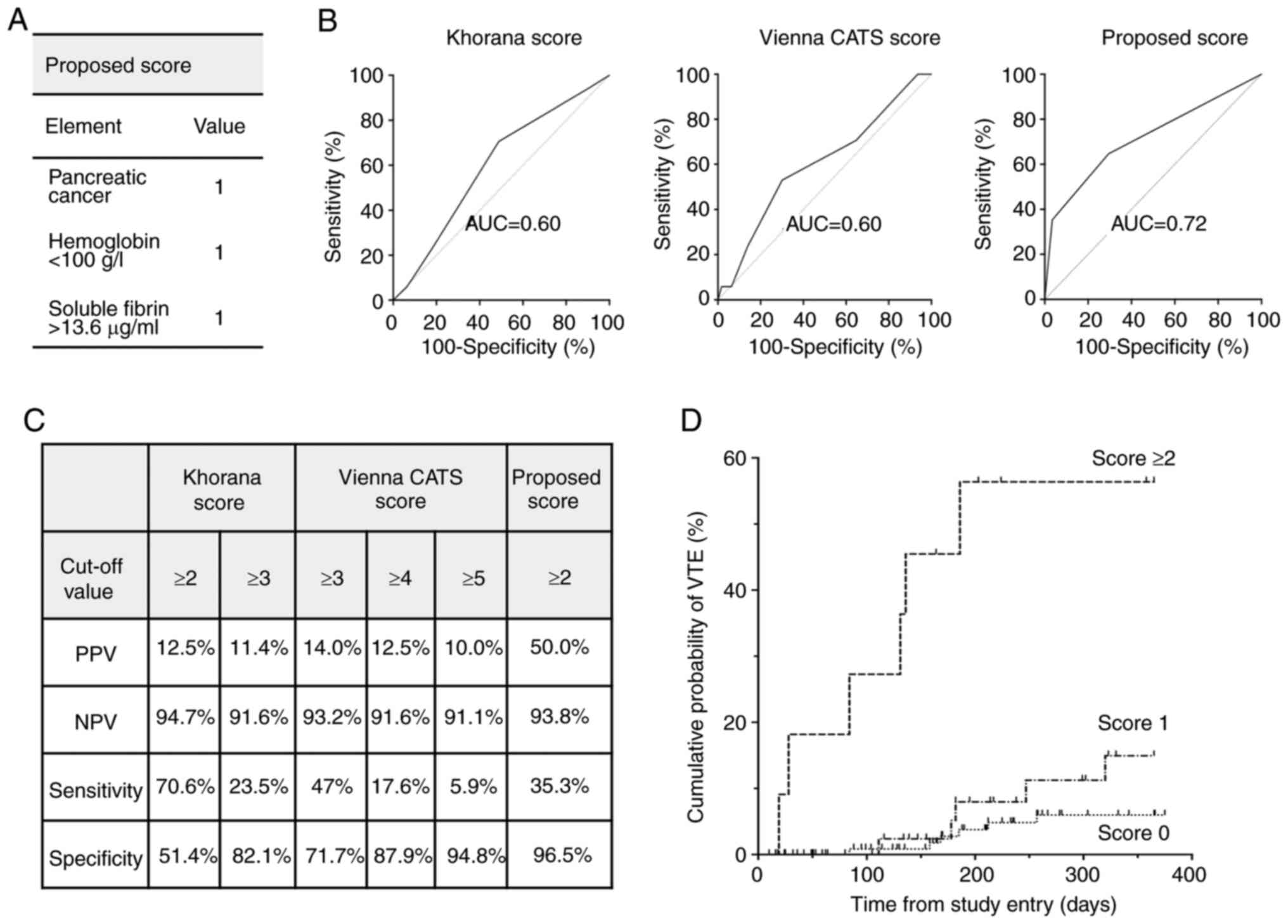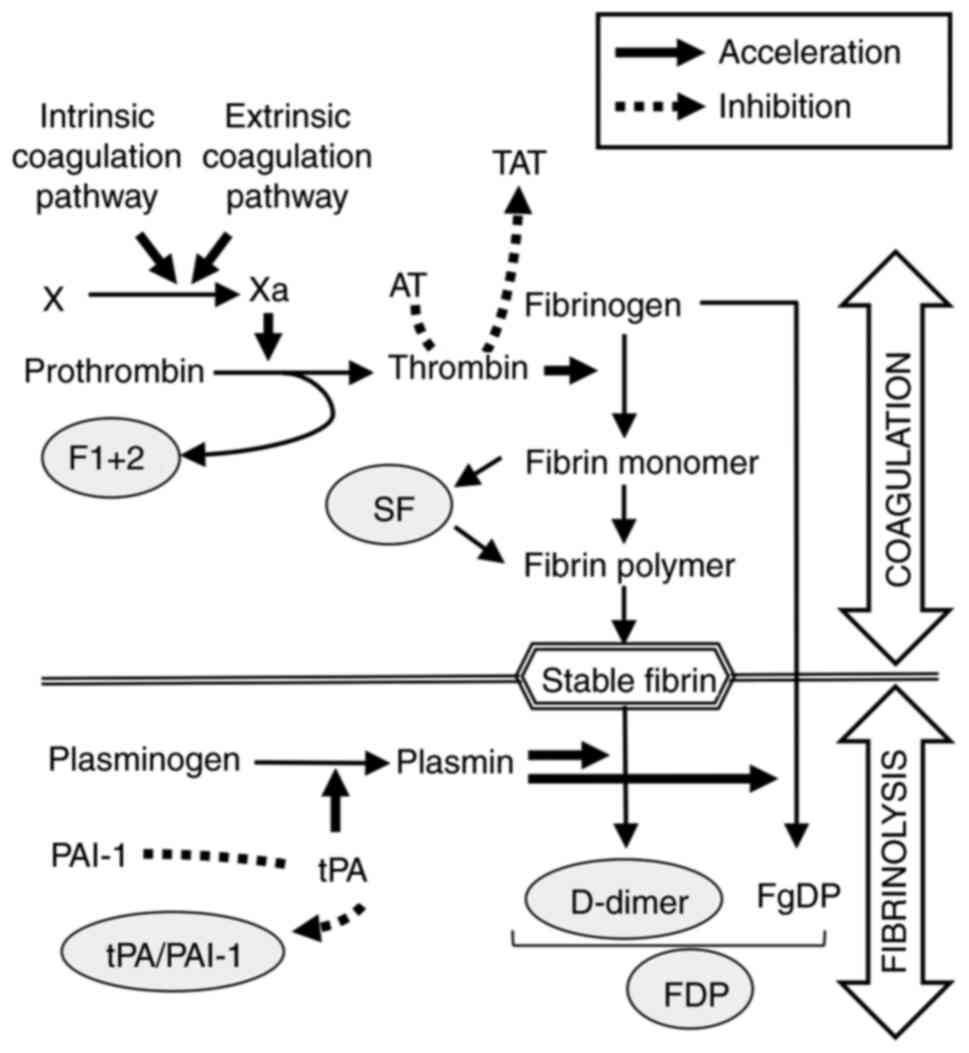|
1
|
Khorana AA, Francis CW, Culakova E,
Kuderer NM and Lyman GH: Thromboembolism is a leading cause of
death in cancer patients receiving outpatient chemotherapy. J
Thromb Haemost. 5:632–634. 2007. View Article : Google Scholar : PubMed/NCBI
|
|
2
|
Heit JA, Silverstein MD, Mohr DN,
Petterson TM, O'Fallon WM and Melton LJ III: Risk factors for deep
vein thrombosis and pulmonary embolism: A population-based
case-control study. Arch Intern Med. 160:809–815. 2000. View Article : Google Scholar : PubMed/NCBI
|
|
3
|
Silverstein MD, Heit JA, Mohr DN,
Petterson TM, O'Fallon WM and Melton LJ III: Trends in the
incidence of deep vein thrombosis and pulmonary embolism: A 25-year
population-based study. Arch Intern Med. 158:585–593. 1998.
View Article : Google Scholar : PubMed/NCBI
|
|
4
|
Khorana AA, Kuderer NM, Culakova E, Lyman
GH and Francis CW: Development and validation of a predictive model
for chemotherapy-associated thrombosis. Blood. 111:4902–4907. 2008.
View Article : Google Scholar : PubMed/NCBI
|
|
5
|
Khorana AA and Connolly GC: Assessing risk
of venous thromboembolism in the patient with cancer. J Clin Oncol.
27:4839–4847. 2009. View Article : Google Scholar : PubMed/NCBI
|
|
6
|
Ay C, Vormittag R, Dunkler D, Simanek R,
Chiriac AL, Drach J, Quehenberger P, Wagner O, Zielinski C and
Pabinger I: D-dimer and prothrombin fragment 1 + 2 predict venous
thromboembolism in patients with cancer: Results from the Vienna
cancer and thrombosis study. J Clin Oncol. 27:4124–4129. 2009.
View Article : Google Scholar : PubMed/NCBI
|
|
7
|
Ay C, Dunkler D, Marosi C, Chiriac AL,
Vormittag R, Simanek R, Quehenberger P, Zielinski C and Pabinger I:
Prediction of venous thromboembolism in cancer patients. Blood.
116:5377–5382. 2010. View Article : Google Scholar : PubMed/NCBI
|
|
8
|
Louzada ML, Carrier M, Lazo-Langner A, Dao
V, Kovacs MJ, Ramsay TO, Rodger MA, Zhang J, Lee AY, Meyer G and
Wells PS: Development of a clinical prediction rule for risk
stratification of recurrent venous thromboembolism in patients with
cancer-associated venous thromboembolism. Circulation. 126:448–454.
2012. View Article : Google Scholar : PubMed/NCBI
|
|
9
|
Verso M, Agnelli G, Barni S, Gasparini G
and LaBianca R: A modified Khorana risk assessment score for venous
thromboembolism in cancer patients receiving chemotherapy: The
protecht score. Intern Emerg Med. 7:291–292. 2012. View Article : Google Scholar : PubMed/NCBI
|
|
10
|
Muñoz Martín AJ, Ortega I, Font C, Pachón
V, Castellón V, Martínez-Marín V, Salgado M, Martínez E, Calzas J,
Rupérez A, et al: Multivariable clinical-genetic risk model for
predicting venous thromboembolic events in patients with cancer. Br
J Cancer. 118:1056–1061. 2018. View Article : Google Scholar : PubMed/NCBI
|
|
11
|
Pelzer U, Sinn M, Stieler J and Riess H:
Primary pharmacological prevention of thromboembolic events in
ambulatory patients with advanced pancreatic cancer treated with
chemotherapy? Dtsch Med Wochenschr. 138:2084–2088. 2013.(In
German). PubMed/NCBI
|
|
12
|
Song C, Shargall Y, Li H, Tian B, Chen S,
Miao J, Fu Y, You B and Hu B: Prevalence of venous thromboembolism
after lung surgery in China: A single-centre, prospective cohort
study involving patients undergoing lung resections without
perioperative venous thromboembolism prophylaxis†. Eur J
Cardiothorac Surg. 55:455–460. 2019. View Article : Google Scholar : PubMed/NCBI
|
|
13
|
Lee JO, Lee JY, Chun EJ, Choi SI, Kim JW,
Kim SH, Kim YJ, Lee KW, Kim JH, Lee JS and Bang SM: Incidence and
predictors of venous thromboembolism in medically ill hospitalized
elderly cancer patients: A prospective observational study. Support
Care Cancer. 27:2507–2515. 2019. View Article : Google Scholar : PubMed/NCBI
|
|
14
|
Kitayama H, Kondo T, Sugiyama J, Kurimoto
K, Nishino Y, Hirayama M and Tsuji Y: Venous thromboembolism in
hospitalized patients receiving chemotherapy for malignancies at
Japanese community hospital: Prospective observational study. BMC
Cancer. 17:3512017. View Article : Google Scholar : PubMed/NCBI
|
|
15
|
Khorana AA, Francis CW, Culakova E,
Kuderer NM and Lyman GH: Frequency, risk factors, and trends for
venous thromboembolism among hospitalized cancer patients. Cancer.
110:2339–2346. 2007. View Article : Google Scholar : PubMed/NCBI
|
|
16
|
Oh SY, Kim JH, Lee KW, Bang SM, Hwang JH,
Oh D and Lee JS: Venous thromboembolism in patients with pancreatic
adenocarcinoma: Lower incidence in Asian ethnicity. Thromb Res.
122:485–490. 2008. View Article : Google Scholar : PubMed/NCBI
|
|
17
|
Wiredu C, Haynes N, Guerra C and Ky B:
Racial and ethnic disparities in cancer-associated thrombosis.
Thromb Haemost. 122:662–665. 2022. View Article : Google Scholar : PubMed/NCBI
|
|
18
|
Lee LH, Gallus A, Jindal R, Wang C and Wu
CC: Incidence of venous thromboembolism in Asian populations: A
systematic review. Thromb Haemost. 117:2243–2260. 2017. View Article : Google Scholar : PubMed/NCBI
|
|
19
|
Ashrani AA, Silverstein MD, Rooke TW, Lahr
BD, Petterson TM, Bailey KR, Melton LJ III and Heit JA: Impact of
venous thromboembolism, venous stasis syndrome, venous outflow
obstruction and venous valvular incompetence on quality of life and
activities of daily living: A nested case-control study. Vasc Med.
15:387–397. 2010. View Article : Google Scholar : PubMed/NCBI
|
|
20
|
Reitter EM, Kaider A, Ay C, Quehenberger
P, Marosi C, Zielinski C and Pabinger I: Longitudinal analysis of
hemostasis biomarkers in cancer patients during antitumor
treatment. J Thromb Haemost. 14:294–305. 2016. View Article : Google Scholar : PubMed/NCBI
|
|
21
|
Tanaka S; Members of The Subcommittee for
Preparing Guidelines for Ultrasound Diagnosis of Venous Thrombosis
of Lower Extremities of The Terminology and Diagnostic Criteria
Committee, Japan Society of Ultrasonics in Medicine, . Nishigami K,
Taniguchi N, Matsuo H, Hirai T, Kaneda S, Ogasawara M, Satoh H and
Tobe H: Criteria for ultrasound diagnosis of deep venous thrombosis
of lower extremities. J Med Ultrason (2001). 35:33–36. 2008.
View Article : Google Scholar : PubMed/NCBI
|
|
22
|
Sørensen HT, Mellemkjaer L, Steffensen FH,
Olsen JH and Nielsen GL: The risk of a diagnosis of cancer after
primary deep venous thrombosis or pulmonary embolism. N Engl J Med.
338:1169–1173. 1998. View Article : Google Scholar : PubMed/NCBI
|
|
23
|
Ay C, Simanek R, Vormittag R, Dunkler D,
Alguel G, Koder S, Kornek G, Marosi C, Wagner O, Zielinski C and
Pabinger I: High plasma levels of soluble P-selectin are predictive
of venous thromboembolism in cancer patients: Results from the
Vienna cancer and thrombosis study (CATS). Blood. 112:2703–2708.
2008. View Article : Google Scholar : PubMed/NCBI
|
|
24
|
Charlson ME, Pompei P, Ales KL and
MacKenzie CR: A new method of classifying prognostic comorbidity in
longitudinal studies: Development and validation. J Chronic Dis.
40:373–383. 1987. View Article : Google Scholar : PubMed/NCBI
|
|
25
|
Dempfle CE, Zips S, Ergül H and Heene DL;
Fibrin Assay Comparative Trial study group, : The fibrin assay
comparison trial (FACT): Evaluation of 23 quantitative D-dimer
assays as basis for the development of D-dimer calibrators. FACT
study group. Thromb Haemost. 85:671–678. 2001. View Article : Google Scholar : PubMed/NCBI
|
|
26
|
Favaloro EJ and Thachil J: Reporting of
D-dimer data in COVID-19: Some confusion and potential for
misinformation. Clin Chem Lab Med. 58:1191–1199. 2020. View Article : Google Scholar : PubMed/NCBI
|
|
27
|
Lutsey PL, Cushman M, Steffen LM, Green D,
Barr RG, Herrington D, Ouyang P and Folsom AR: Plasma hemostatic
factors and endothelial markers in four racial/ethnic groups: The
MESA study. J Thromb Haemost. 4:2629–2635. 2006. View Article : Google Scholar : PubMed/NCBI
|
|
28
|
Tang L and Hu Y: Ethnic diversity in the
genetics of venous thromboembolism. Thromb Haemost. 114:901–909.
2015. View Article : Google Scholar : PubMed/NCBI
|
|
29
|
Yu YB, Gau JP, Liu CY, Yang MH, Chiang SC,
Hsu HC, Hong YC, Hsiao LT, Liu JH, Chiou TJ, et al: A nation-wide
analysis of venous thromboembolism in 497,180 cancer patients with
the development and validation of a risk-stratification scoring
system. Thromb Haemost. 108:225–235. 2012. View Article : Google Scholar : PubMed/NCBI
|
|
30
|
Lee CH, Lin LJ, Cheng CL, Kao Yang YH,
Chen JY and Tsai LM: Incidence and cumulative recurrence rates of
venous thromboembolism in the Taiwanese population. J Thromb
Haemost. 8:1515–1523. 2010. View Article : Google Scholar : PubMed/NCBI
|
|
31
|
Nakamura M, Miyata T, Ozeki Y, Takayama M,
Komori K, Yamada N, Origasa H, Satokawa H, Maeda H, Tanabe N, et
al: Current venous thromboembolism management and outcomes in
Japan. Circ J. 78:708–717. 2014. View Article : Google Scholar : PubMed/NCBI
|
|
32
|
Khorana AA, Francis CW, Culakova E and
Lyman GH: Risk factors for chemotherapy-associated venous
thromboembolism in a prospective observational study. Cancer.
104:2822–2829. 2005. View Article : Google Scholar : PubMed/NCBI
|
|
33
|
Ay C, Jungbauer LV, Sailer T, Tengler T,
Koder S, Kaider A, Panzer S, Quehenberger P, Pabinger I and
Mannhalter C: High concentrations of soluble P-selectin are
associated with risk of venous thromboembolism and the P-selectin
Thr715 variant. Clin Chem. 53:1235–1243. 2007. View Article : Google Scholar : PubMed/NCBI
|
|
34
|
Tsuji A, Wada H, Matsumoto T, Abe Y, Ota
S, Yamada N, Sugiyama T, Sudo A, Onishi K, Nakatani K, et al:
Elevated levels of soluble fibrin in patients with venous
thromboembolism. Int J Hematol. 88:448–453. 2008. View Article : Google Scholar : PubMed/NCBI
|
|
35
|
Wada H, Kobayashi T, Abe Y, Hatada T,
Yamada N, Sudo A, Uchida A and Nobori T: Elevated levels of soluble
fibrin or D-dimer indicate high risk of thrombosis. J Thromb
Haemost. 4:1253–1258. 2006. View Article : Google Scholar : PubMed/NCBI
|
|
36
|
Dempfle CE, Wurst M, Smolinski M, Lorenz
S, Osika A, Olenik D, Fiedler F and Borggrefe M: Use of soluble
fibrin antigen instead of D-dimer as fibrin-related marker may
enhance the prognostic power of the ISTH overt DIC score. Thromb
Haemost. 91:812–818. 2004. View Article : Google Scholar : PubMed/NCBI
|
|
37
|
Aota T, Wada H, Yamashita Y, Matsumoto T,
Ohishi K, Suzuki K, Imai H, Usui M, Isaji S, Asakura H, et al: An
evaluation of the modified diagnostic criteria for DIC established
by the Japanese society of thrombosis and hemostasis. Clin Appl
Thromb Hemost. 23:579–584. 2017. View Article : Google Scholar : PubMed/NCBI
|
|
38
|
Yukizawa Y, Inaba Y, Watanabe S, Yajima S,
Kobayashi N, Ishida T, Iwamoto N, Choe H and Saito T: Association
between venous thromboembolism and plasma levels of both soluble
fibrin and plasminogen-activator inhibitor 1 in 170 patients
undergoing total hip arthroplasty. Acta Orthop. 83:14–21. 2012.
View Article : Google Scholar : PubMed/NCBI
|
|
39
|
Yukizawa Y, Inaba Y, Kobayashi N, Ike H,
Kubota S and Saito T: Selective pharmacological prophylaxis based
on individual risk assessment using plasma levels of soluble fibrin
and plasminogen-activator inhibitor-1 following total hip
arthroplasty. Mod Rheumatol. 24:835–839. 2014. View Article : Google Scholar : PubMed/NCBI
|
|
40
|
Ay C, Pabinger I and Cohen AT:
Cancer-associated venous thromboembolism: Burden, mechanisms, and
management. Thromb Haemost. 117:219–230. 2017. View Article : Google Scholar : PubMed/NCBI
|
|
41
|
Bockenstedt P: D-dimer in venous
thromboembolism. N Engl J Med. 349:1203–1204. 2003. View Article : Google Scholar : PubMed/NCBI
|
|
42
|
Khorana AA, Carrier M, Garcia DA and Lee
AYY: Guidance for the prevention and treatment of cancer-associated
venous thromboembolism. J Thromb Thrombolysis. 41:81–91. 2016.
View Article : Google Scholar : PubMed/NCBI
|
|
43
|
Carrier M, Abou-Nassar K, Mallick R,
Tagalakis V, Shivakumar S, Schattner A, Kuruvilla P, Hill D,
Spadafora S, Marquis K, et al: Apixaban to prevent venous
thromboembolism in patients with cancer. N Engl J Med. 380:711–719.
2019. View Article : Google Scholar : PubMed/NCBI
|
|
44
|
Khorana AA, Soff GA, Kakkar AK, Vadhan-Raj
S, Riess H, Wun T, Streiff MB, Garcia DA, Liebman HA, Belani CP, et
al: Rivaroxaban for thromboprophylaxis in high-risk ambulatory
patients with cancer. N Engl J Med. 380:720–728. 2019. View Article : Google Scholar : PubMed/NCBI
|
|
45
|
Prandoni P, Lensing AW, Piccioli A,
Bernardi E, Simioni P, Girolami B, Marchiori A, Sabbion P, Prins
MH, Noventa F and Girolami A: Recurrent venous thromboembolism and
bleeding complications during anticoagulant treatment in patients
with cancer and venous thrombosis. Blood. 100:3484–3488. 2002.
View Article : Google Scholar : PubMed/NCBI
|
|
46
|
Mansfield A, Tafur AJ, Wang CE, Kourelis
TV, Wysokinska EM and Yang P: Predictors of active cancer
thromboembolic outcomes: Validation of the Khorana score among
patients with lung cancer. J Thromb Haemost. 14:1773–1778. 2016.
View Article : Google Scholar : PubMed/NCBI
|
|
47
|
Vathiotis I, Dimakakos EP, Boura P,
Ntineri A, Charpidou A, Gerotziafas G and Syrigos K: Khorana score:
Νew predictor of early mortality in patients with lung
adenocarcinoma. Clin Appl Thromb Hemost. 24:1347–1351. 2018.
View Article : Google Scholar : PubMed/NCBI
|















